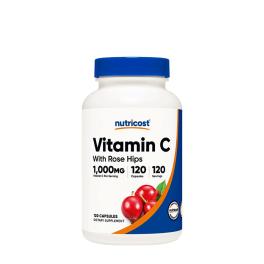Rosehip is the plant of choice in traditional medicine. Studies have confirmed that it can improve skin, liver, kidney, inflammatory diseases and cardiovascular problems. Much of its effects are due to its antioxidant properties.
Rosehip contains a number of antioxidant active ingredients, including vitamin A, vitamin C, phenols, and anti-inflammatory unsaturated fatty acids. These help protect against free radicals that damage cells. These free radicals damage cells (take electrons from cells) during oxidative stress. Antioxidants supply electrons to damaged cells, as each antioxidant can supply electrons at different rates, so the more different antioxidants a plant contains, the more effective it is in protecting against free radicals.
Free radicals are also released by toxins, UV radiation, but the body's internal processes also produce free radicals. Inflammatory cells (which are responsible for wound healing and fighting infections) also damage cells by producing free radicals - naturally damaged cells or infections caused by the wound, but they can also damage healthy cells through excessive inflammation or autoimmune processes, which can trigger a number of pathological processes that can later become diseases. This is what antioxidants protect against.
In terms of antioxidant content, rosehip is outstanding, with a diverse and outstanding antioxidant content. Since inflammation is behind much of cardiovascular disease, rosehips can help prevent it.
Obesity is a predisposing factor for cardiovascular disease (stroke, diabetes, hypertension, heart attack, etc.), but incredibly, a new study suggests that rosehips may also help with weight control. To understand this it is important to know that adipose tissue has two different cell types, white and brown adipose tissue. White adipose tissue is responsible for storing fat cells and necessarily releasing them, whereas brown adipose tissue contributes to energy production by generating heat, and brown adipose tissue is essential for energy production. Part of the white adipose tissue may be converted into calorie-burning brown adipose tissue, which occurs when energy is scarce (we are in a calorie deficit). Studies have shown that rosehip stimulates the browning of white fatty tissues. And by losing weight, the risk of cardiovascular disease is further reduced.
In addition, rosehip also has joint-protective effects, which may improve the health of people with arthritis. Thanks to its antioxidant properties and a specific active ingredient that reduces inflammation and moistures joints, especially in damaged joints.
Thanks to its antioxidant properties and a specific active ingredient that reduces inflammation and moisturises joints, especially in damaged joints. Its antioxidant and moisturising properties can firm and elasticise the skin.
Rosehip is most commonly available in powder form, with most studies using a dose of 5-10 grams. It should be consumed with meals.
Studies have also looked that at the side effects of rosehip powder up to 40 grams, with no significant side effects other than diarrhoea.













